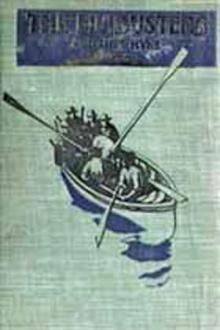The Filibusters - Charles John Cutcliffe Hyne (best english books to read for beginners .TXT) 📗

- Author: Charles John Cutcliffe Hyne
- Performer: -
Book online «The Filibusters - Charles John Cutcliffe Hyne (best english books to read for beginners .TXT) 📗». Author Charles John Cutcliffe Hyne
It is true that Delicia knew him domestically, and advertised his peculiarities most impartially. She said: ” My dear Don Juan is an out-and-out Sacaronducan. He’s adapted himself most thoroughly to the requirements of the country. That is, he’s as big a thief as any man can be without getting hanged. But he’s the most gentlemanly kind of brigand imaginable, and, moreover, he’s very successful at his trade.”
“His trade?” said Miss Armitage, doubtfully. “Has he a business? Does he make something?”
“There you go again! Oh, this fine old crusted Irish pride! What does it matter if the man sells lottery tickets; what does it matter if he makes soap, so long as he is successful at it? You don’t see that? You think a soldier, whose pay isn’t even big enough to square his mess bill, far more desirable as a husband.”
“It appears so,” said Miss Armitage.
“Now I’ve not that humdrum sort of taste. I can fancy I shall get tired of dancing and gadding about, and those sort of things, some day, and I shall take up another set of interests. I shall want to be something big. And being tied up to a man who was content with commanding a troop in a lancer regiment wouldn’t help me to that. I should either want a nobody or a somebody.”
“But I’m not you,” Miss Armitage objected.
“My dear child,” said Delicia drily, ” you are not. That is why I strongly advise you to marry Juan, who is emphatically a somebody. He is distinctly taken up with you, probably because you are nothing like anything he has ever come across before; and so you can do it if you like. His ‘ trade ‘ which you so object to is one which kings dabble in, so that it does not lack respectability. An American would describe him as an operator in real estate; we in Sacaronduca speak of him as a mine-grabber; and a monarch employed on the same occupation would describe the process as annexation. We will speak of it as a profession if that pleases you better.”
“Ah,” said Miss Armitage, ” of course, all this is very interesting, but it can’t be of use to me, because I am still engaged to Charlie.”
“You will also observe,” continued her friend, “that Don Juan is a man of excellent family, better, if anything, than your own, and that is an obsolete thing which I know you Irish people set a lot of store by. His ancestors came over from Arragon with King Jaime the Conqueror, selecting the slice of Majorca which pleased them, and took possession by torturing to death all the Moors they found on the premises. A marquisate was the natural reward, and as it has been kept going ever since, the present family can trace .a distinguished connection with almost every piece of brilliant knavery which has taken place between 1400 and now,”
“Delicia,” said the other, ” you are laughing at me.”
“Have you found that out? Then, my dear child, let me advise you to take care. I am always most dangerous when I’m laughing.”
Now precisely how it came about I do not know; and no one who can do so with accuracy seems inclined to tell me; but it is a certain fact that one month after this talk took place these two girls were married women on their way out to Sacaronduca. There are many yarns straying about as to why and wherefore, but I see no reason to doubt that they are one and all of them guesswork, and therefore quite unworthy of repetition. There is a mystery hanging over the whole affair, and so far as I am concerned it must remain there. Perhaps the other man who is writing the separate book upon Miss Delicia’s life may be authorised to raise it.
One thing, however, is certain, as may be seen from official records in Paris. The little lady from Ireland assisted (as per agreement) in Delicia’s wedding, and then figured in her own with Don Juan Carmoy.
Delicia of course achieved the unexpected. Everyone took it for granted that her husband would be some heroic being of the heroic order. Indeed, several men who were (or fancied themselves to be) in this category offered themselves as aspirants for the vacant post. Not a bit of it; she would have none of them. She picked out a little, delicate, dainty-voiced Italian, whose one marked trait was that he carried his cigarette tobacco in a Louis Quatorze snuff-box. He had not another feature to distinguish him from the general herd, or money, or position, or anything except the manners of a gentleman. And she married him, departing the same day for Sacaronduca with the Carmoys, and leaving that part of Europe and Great Britain which knew her in a very curious twitter of surprise.
When they heard that her husband had died of sunstroke on the voyage out they wondered what Delicia would do next. There were not wanting cynics who said that it was a merciful release for him.
A VERY pestilence of bullets swept against us as we left the cover of the trees and dashed across the bare strip, and every moment the line of heads above the white parapet of the fort grew blacker with numbers. Our men were falling with fearful rapidity, but their discipline held. They kept to their line, neither spurting forward nor lingering behind; and because the order had not been given, they fired no single shot. A set of iron targets could not have endured that terrible punishment more stoically.
We reached a point thirty yards from the walls, and a bugle rang out a lusty call. One half of our little force stopped instantly, dropping behind any boulder or clump of grass which would offer a vestige of shelter, and offering a smart fire with their repeating rifles to cover the attack of the rest. It was the fusilade of practical marksmen, and as coolly delivered as if they had been firing at the range on the White Tortuga Key. It did heavy execution, but there was such an abundance of men in the fort that as fast as one fell another was ready to stop up the gap.
By this time we had come to a very fit mind for the work. We had ceased to be men having human fears; the thought of death or maiming had gone from us; the lust of the battle had filled us like long draughts of spirit. We bit our teeth, and thought of nothing but getting at handgrips.
We reached the foot of the white concrete wall, and stood in a ditch sown with empty tins and crockery. For an instant we found a lee out of the pelting; but for an instant only. The next the soldiers were craning over the parapet and shooting down on us.
I cannot speak of what happened collectively after this. It was a time for individual striving. I only know what occurred to myself. From out of the blinding, stinking smoke one of the defenders fell down between me and the wall, striking my arm as he fell. I gripped one of our fellows, drew him to me, and made him stand on the corpse. Then I clambered on to his shoulders, and stood for a second panting and blindly nuzzling the wall. The sweat and the smoke poured in my eyes, and I could not see a thing, but sweeping about with my fingers found a crack in the masonry.
Somebody from above made a stab at me with a bayonet. My spare hand closed on it; I gave a spring from below, and next instant was on the ridge of the wall. The man with the bayonet wrenched it from my grasp and drew it back to stab. At the same moment some one behind raised a rifle and fired, and the man fell with half his head blown away.
Remembering the thing afterwards, I concluded that that shot was intended for me; but at the time I did not stop to think; was not even thankful for the let-off; but picking up a rifle from the ground, raged with the butt against every man I could see. Indeed, there was no lack of them. They ringed me round in a fence of weapons and savage faces with teeth gleaming like dogs, and had not relief come they must surely have got me down in another few seconds.
But first another of our men clambered up, and fired a revolver from so close behind that the grains of powder stung my neck; and then from through the smoke the General came with a dozen others; and then from the other side of the fort there came a diversion of another kind. Carew’s men had turned up just in the nick of time.
We knew of it first by a rattle of startled yells, then by some unmistakably British shouts (which, if the truth be known, were mainly curses), and then by some bugle calls and a thinning of the soldiers who were trying to drive us back over the walls. The fight eddied, and staggered, and dwindled like a snowball which is set on a warm hob. The Spaniards began to throw away their weapons and run for the barracks in the middle of the fort. Our men killed a little more to appease the ” manes ” of their comrades: ” Here’s an end to you to square up for poor old Frank,” one would say, and “To hell you go, my son,” another would shout, ” because you sent my best chum there ten minutes back;” but considering the place had been carried by storm, there were no glowing atrocities in the sack. The men soon calmed down, what few there were left of them, and stood ready to do the General’s bidding. There was much to be gone through before he got his hand over all Los Angeles.
Orders followed on the heels of one another with quick despatch. First, nine men were sent to summon the other nine forts to surrender, each of them being accompanied by a comrade who carried a white flag. Next, we set about gaoling the prisoners, disarming them thoroughly, and stowing them in a long, narrow cellar. At the entrance of this a couple of Nordenfeldts were run up, so as to rake the whole, if necessary, and, as only two men could be spared as sentries, the prisoners were given clearly to understand that at the least sign of trouble, they would be annihilated. And then gun crews were apportioned off to the big Krupp cannon with which the fort was armed, with ammunition carriers to supply them.
We officers saw to these duties, and then gathered round the General, who had stationed himself at the foot of the flagstaff in the centre of the fort. Carew had a red bandage round his left arm, and carried it in a sling made from his sash. The rest of us were unwounded, save for myself, who had picked up from somewhere or other a bayonet graze against the fifth rib.
“Fluellen,” said the General, ” has failed me badly. He will probably have good excuses; but I do not care for excuses; I prefer good service.





Comments (0)